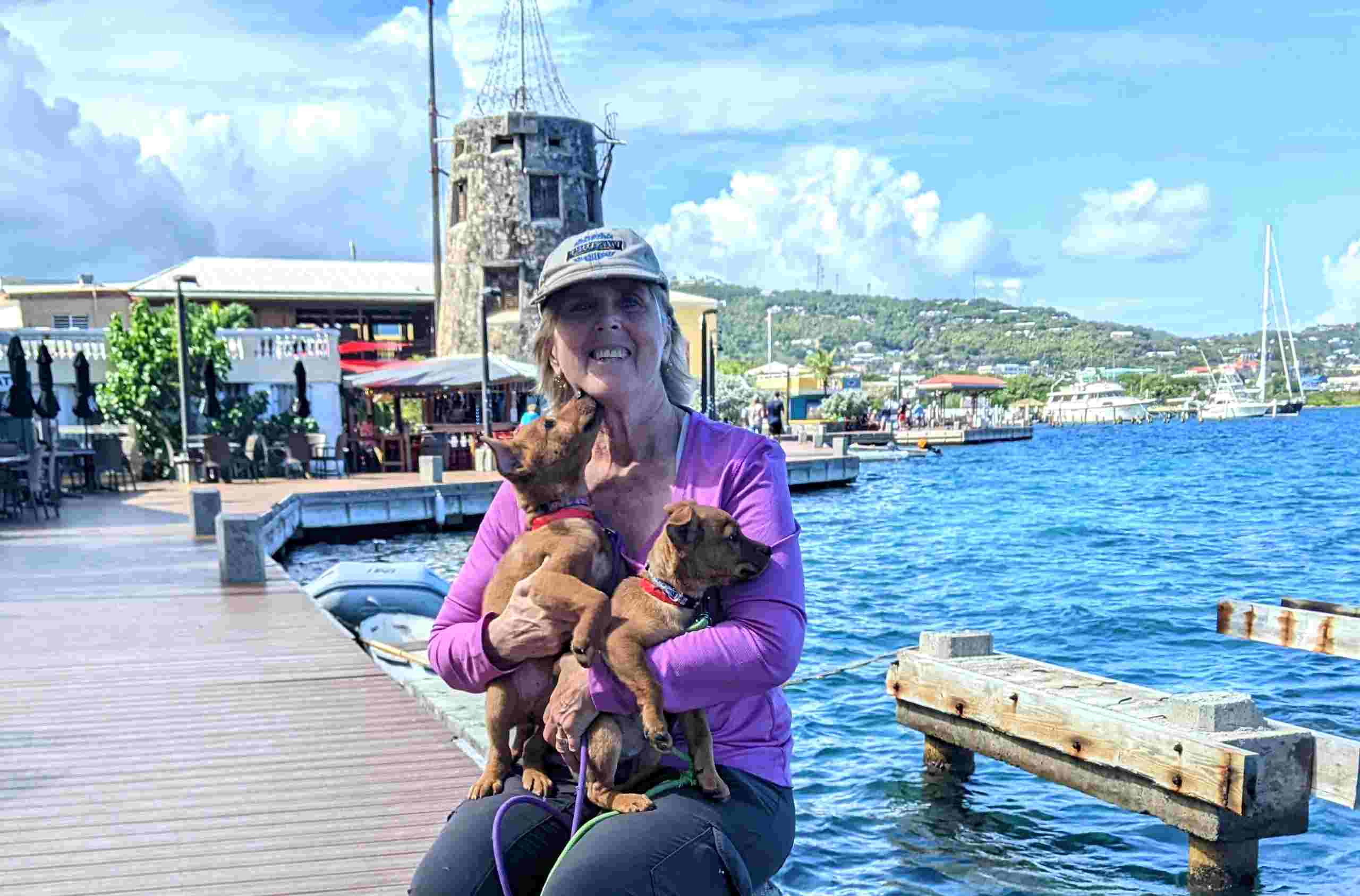Coming Home From the Tropics
posted on
January 16, 2022

Bruce and Carole visited St. Croix last week and brought back two rescue puppies. Before traveling to the frigid New Hampshire weather, Joy and Jingle enjoyed time on the boardwalk in Christiansted, U.S. Virgin Islands.
By the time you read this, Bruce and I will be back at Miles Smith Farm after our weeklong visit to St. Croix in the U.S. Virgin Islands, and after four days on the road, our nine traveling bovines have arrived in California. The cattle now have a home in the moderate temperatures of central California, free of bitter cold and frozen water troughs. We return to freezing temperatures. I'm not complaining.
Travel for cattle and people has one similarity these days. The bovines needed health certificates before crossing state lines, and Bruce and I needed proof of negative Covid tests before we boarded the plane. Happily for the cattle, they didn't have to wear masks.
We traveled to St. Croix to visit relatives and connect with Learning Networks Foundation (LNF) board members Sonia and Sandra, who live there. LNF is the nonprofit linked to our farm. It has programs in New Hampshire and the U.S. Virgin Islands. The keyword is "Learning." In New Hampshire, children and adults learn to train long-haired Scottish Highlander cattle. In St. Croix, it's about learning respect for the natural environment and the wildlife on the island.
Snakes on St. Croix
For instance, snakes are not native to the island. Before 2014, one non-native Red-Tailed Boa was discovered by Dr. William Coles, who works for the U.S. Virgin Islands Department of Planning and Natural Resources, which is similar to the New Hampshire Fish and Game Department. Some were released by human owners leaving St. Croix and are now breeding and multiplying. The snakes eat native birds, frogs, and other wildlife, threatening native species if left unchecked. The Foundation has plans to work with Dr. Coles to create educational programs about invasive species, like snakes, hoping to enlist the public in his defensive effort.
Another mission I had on this trip was to adopt two puppies to bring the farm. The St. Croix Animal Shelter's vigorous spay/neuter program has cut the stray population that thrives in this tropical climate, but puppies still happen. I adopted two abandoned puppies, Joy and Jingle, as companions for Flora, a St. Croix stray I adopted last year.
Most airlines allow pet carry-on for small dogs and cats. Joy and Jingle will travel together (the brother and sister are small) in a pet carrier stowed under the seat in front of me. I'll let them out at the Fort Lauderdale airport to stretch their puppy legs. Hopefully, Fort Lauderdale has one of those "doggie bathrooms," complete with fake grass, a fire hydrant, and a washing area. Ten years ago, there were no puppy potties. Now it seems they are in every airport. Are dog frequent-flier miles next?
Back to the Cold
I swam in the warm Caribbean Sea almost every day. Flip-flops and a big hat to shield me from the sun were standard for me. I didn't have to bundle up against wind chill, but I still missed New Hampshire. It was not freezing water and the below-zero wind chill; those I could do without. I missed brushing the young cattle and snuggling with Topper the steer. I'm also eager to see how Flora reacts to her new friends.
I wonder if the California cattle will miss their New Hampshire birthplace? I'm sure they will adapt to the warmer weather, but maybe their new owner, Michelle Miller, will find a big floppy hat to protect Ferdinand from the sun.



